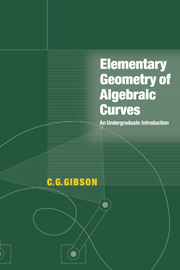Book contents
- Frontmatter
- Contents
- List of Illustrations
- List of Tables
- Preface
- 1 Real Algebraic Curves
- 2 General Ground Fields
- 3 Polynomial Algebra
- 4 Affine Equivalence
- 5 Affine Conics
- 6 Singularities of Affine Curves
- 7 Tangents to Affine Curves
- 8 Rational Affine Curves
- 9 Projective Algebraic Curves
- 10 Singularities of Projective Curves
- 11 Projective Equivalence
- 12 Projective Tangents
- 13 Flexes
- 14 Intersections of Projective Curves
- 15 Projective Cubics
- 16 Linear Systems
- 17 The Group Structure on a Cubic
- 18 Rational Projective Curves
- Index
14 - Intersections of Projective Curves
Published online by Cambridge University Press: 05 June 2012
- Frontmatter
- Contents
- List of Illustrations
- List of Tables
- Preface
- 1 Real Algebraic Curves
- 2 General Ground Fields
- 3 Polynomial Algebra
- 4 Affine Equivalence
- 5 Affine Conics
- 6 Singularities of Affine Curves
- 7 Tangents to Affine Curves
- 8 Rational Affine Curves
- 9 Projective Algebraic Curves
- 10 Singularities of Projective Curves
- 11 Projective Equivalence
- 12 Projective Tangents
- 13 Flexes
- 14 Intersections of Projective Curves
- 15 Projective Cubics
- 16 Linear Systems
- 17 The Group Structure on a Cubic
- 18 Rational Projective Curves
- Index
Summary
In this central chapter, we justify (in some measure) the statement that the complex projective plane Pℝ2 is the natural environment in which to study curves, by proving Bézout's Theorem: the number of intersections of two curves F, G in Pℂ2 having no common component is the product of their degrees. Although the geometric idea behind the proof is compelling, the mechanics founder on a central difficulty, namely that of saying precisely what one means by the ‘number of intersections’ I(P, F, G) of one curve F with another curve G at a point P. There are various ways forward here, each with its own merits and demerits. We will follow a classical geometric idea to arrive at a ‘candidate’ definition. The demerit of this approach is that the definition depends on a choice of coordinates, and it is by no means obvious that the result is independent of the choice. For the sake of completeness, we will present an invariance proof in the final section, based on standard ideas from complex analysis.
The Geometric Idea
We need the idea of ‘projection’ from a point onto a line in PK2. We are given a line L, and a point S not on L. Then for any point Q ≠ S there is a unique line M joining Q, S. Let QL to be the unique point where the line M meets L. (Figure 14.1.) We define projection of the plane, from the point S onto the line L, to be the mapping Q ↦ QL.
Information
- Type
- Chapter
- Information
- Elementary Geometry of Algebraic CurvesAn Undergraduate Introduction, pp. 173 - 189Publisher: Cambridge University PressPrint publication year: 1998
